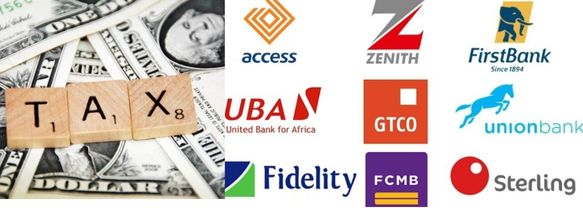The proposed enforcement of 70 per cent windfall tax on profits generated from foreign exchange (FX) transactions by Nigerian banks has been generating mixed reactions across the country.
While some have expressed support for the policy, others have opposed it.
Join our WhatsApp ChannelThe harmonisation of FX windows and floating of the naira last year by the current administration, consequently led to the devaluation of the local currency. This saw the exchange rate jump by over 300 per cent. This led to substantial increases in the value of banks’ assets held in foreign currencies like the United States Dollars, British Pounds and Euro.
Why Govt Proposed Windfall tax
Faced by heightening debt sustainability concerns amid persisting decline in revenue, the Nigerian government on 17th July 2024, submitted an executive bill to the National Assembly proposing a controversial legislation that would lead to imposing 70 per cent tax on the banks’ realised profits from FX transactions within the 2023 financial year. This means taking retrospective effect. The law equally threatens fines for non compliance by any bank.
Agusto & Co., a credit rating agency, estimated that the banks earned about N2.5 trillion from foreign currency-related income in 2023, putting the expected revenue from the proposed tax at N1.75 trillion.
The federal government intends to use funds realised from tax drive to address its fiscal challenges such as financing the supplementary budget of N6.2 trillion and others.
Impact on Banking Sector, Economy
In an interview with Primebusiness.africa, Dr Wisdom Selekekeme, Krokeyi, a lecturer, in Economics Department, Niger Delta University, said the windfall tax is a good policy as it is aimed at redistributing high unexpected gains of corporate entities for public benefits.
“The policy is aimed at distributing unexpected gains for public benefits by providing for society such as social programmes, infrastructure and even economic stabilisation, ” he stated.
He, however, said what is worrisome about the policy is its retrospective effect. He said enforcing the tax after banks have concluded and published 2023 financial year records is not a fair deal to the banking sector in the country and could create uncertainty and erode investors’ confidence.
READ ALSO: Private Jet, Windfall Tax And New Capital Base For Banks
“Investors would always prefer a stable and predictable tax environment. So, a tax environment that is not predictable will make investors to be a little bit fearful and scary,” the don stated.
The economic expert noted that banks play a vital role of providing credits and other financial services, stressing that any additional tax on their profits could reduce their profitability, leading to “stiffer and tighter credit conditions and that could have knock-on effect on economic growth of Nigeria.”
The Minister of Finance and Coordinating Minister of the Economy, Mr Wale Edun, had last week said the introduction of the controversial windfall tax in the banking industry was aimed at redistributing unearned income, adding that Nigeria is not an exception as it is done “everywhere else in the world where you have, especially the energy sector as well as banking.”
“Where you have unearned income, where you have a section of the society or an industry or a set of companies that earn money through no dint of hard work of their own.
“The society deserves a chance to share some of that and it’s just redistribution of that. So I think that takes care of the issue of the windfall levy,” the finance minister added.
Krokeyi, who agreed with the minister’s assertion, however, expressed concern that based on past antecedents, Nigeria has not been fair in the utilisation of proceeds from such taxes for the public good due to corruption.
He observed that the policy is still vague and called for clarification on how such tax will be applied. According to him, having clear communication about the tax would help mitigate the negative impacts.
He said: “If such windfall tax is going to be sustained moving forward, guidelines must be clear, communication should be clear and the criteria should be made known, including how such taxes will be implemented. That will enable investors to build some level of confidence and enable them to plan for their future investments.”
The windfall tax has continued to generate reactions among stakeholders in the banking industry.
70% Windfall Tax a Heavy Burden – Bank Directors
In a statement released on Monday, after its board meeting, the Bank Directors Association of Nigeria said the proposed tax is not only excessive and burdensome but ill-timed, considering the ongoing recapitalisation exercise ordered by the Central Bank of Nigeria (CBN) that requires banks to increase their capital base.
The bank directors lamented that such levy is capable of stifling economic growth and innovation in the banking sector.
They said all vital stakeholders ought to have been consulted before implementing the policy.
“While the imposition of this windfall tax appears to be a response to the current economic climate, we suggest that a 70 per cent tax rate is excessively burdensome and ill-timed, particularly considering the ongoing bank recapitalisation efforts. Such a high levy has the potential to stifle growth and innovation within the banking sector, ultimately affecting the quality of services we provide to our customers and the broader economy,” part of the statement signed by BDAN chairman, Mustafa Chike-Obi read.
The group also expressed concern about the ambiguity of the language of the provisions in the Finance Act that was amended.
It said the law leaves unanswered questions, such as, “whether the windfall tax will be implemented as a Total Tax charge on banks, incorporating other taxes already levied such as Company Income tax, Tertiary Education Tax, National Information Development Levy etc.”
The association also asked for clarification on “what constitutes ‘FX transactions’ to be taxed and the treatment of banks that may incur losses rather than gains during this period.” “We urge the government to provide clear guidelines on this matter to avoid further uncertainty,” the group added.
While contending that Nigerian banks were among the most heavily taxed in the world, the bank directors urged the National Assembly to revisit the law and create an opportunity for engagement with stakeholders in the banking sector to harvest inputs on how to make the tax policy serve the interest of all.
Windfall Tax timing counter-productive
Commenting on the tax policy, Augusto & Co, in its July newsletter under the title “Nigeria’s Retroactive Windfall Tax: A Short-Term Fix, Long-Term Risk,” said while the federal government considers using funds realized from the windfall tax to finance part of its 2024 budget deficit, it will have a long term impact on the banking sector and the economy generally.
“Retroactive taxation is a significant deterrent to investment as it creates a climate of uncertainty, making it difficult for businesses to accurately forecast their tax liabilities. Such unpredictability can erode investor confidence and discourage future investments,” the agency stated.
The agency pointed out that targeting the banking sector, which is “a critical economic intermediary, seems counterintuitive to stimulating growth.”
It warned that the proposed windfall tax “is likely to have a credit-negative impact on Nigerian banks, substantially eroding profits.
“Institutions with capital adequacy close to regulatory thresholds will be particularly vulnerable. To offset the tax burden, banks may tighten lending standards, resulting in higher borrowing costs for individuals and businesses. This could ultimately stifle economic activity and hinder growth prospects.”
It also echoed concerns that the timing is wrong given the ongoing recapitalisation exercise ordered by the Central Bank of Nigeria. “the proposed windfall tax is an unwelcome distraction that could further strain the industry’s ability to raise the necessary capital, particularly from foreign investors,” the agency warned.
It also observed that the tax could also have negative impact banks’ share prices in the short term.
During his inaugural speech, President Bola Tinubu had stated that his administration will focus on broadening the tax base and reducing the overall tax burden to foster a business-friendly climate essential for sustained economic growth. Critics have questioned the new windfall tax, whether it tallies with that objective.
Also commenting on the windfall tax, international tax consulting firm, PwC, noted the possible negative impact of its retrospective imposition on investors’ confidence. The tax firm said the introduction of the windfall tax signals a new era of fiscal policy that requires careful navigation by both the banking sector and the government. “While the tax aims to ensure that banks contribute their fair share to the national coffers, it must be implemented in a manner that upholds legal principles and maintains investor confidence,” the company stated. It added that if the tax law only applies to realised profits in 2023, the federal government would on earn marginal revenue that would not fulfill its revenue objectives.
Victor Ezeja is a passionate journalist with six years of experience writing on economy, politics and energy. He holds a Masters degree in Mass Communication.



















Follow Us